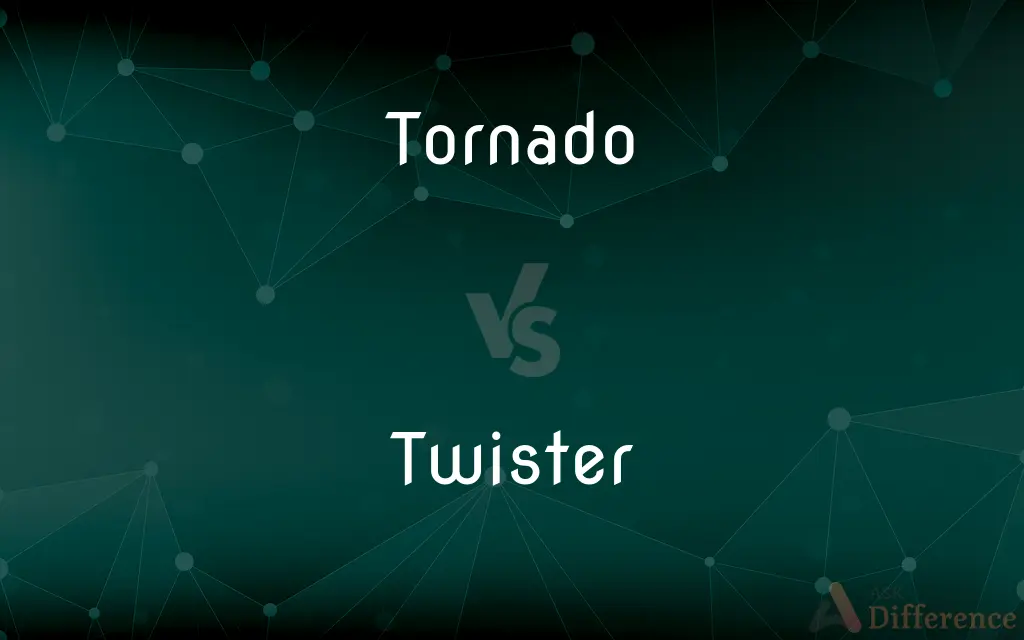Tornado vs. Twister — What's the Difference?
By Fiza Rafique & Maham Liaqat — Updated on March 24, 2024
A tornado is a violently rotating column of air in contact with both the ground and a cumulonimbus cloud, often causing significant damage. "Twister" is a colloquial term for a tornado, with no scientific distinction between them.

Difference Between Tornado and Twister
Table of Contents
ADVERTISEMENT
Key Differences
Tornadoes are weather phenomena characterized by their intense rotational speed, ability to lift debris, and potential for destruction. They form under specific meteorological conditions, typically involving severe thunderstorms. Tornadoes are measured on the Enhanced Fujita scale, which assesses their intensity based on the damage they cause. In contrast, "twister" is simply an informal name for a tornado, used commonly in everyday language and popular media. There is no difference in the meteorological characteristics or the scale of damage when comparing the two terms; "twister" is just a more colloquial way to refer to a tornado.
Both terms are used to describe the same weather event, and their usage can depend on regional preferences or contexts. For example, in scientific and meteorological discussions, the term "tornado" is preferred for its technical accuracy. Meanwhile, "twister" might be used more in casual conversation or in the media to add a dramatic effect or to avoid repetitiveness in language. Despite the difference in terminology, the public's understanding and response to warnings or reports of either should be the same, recognizing the serious threat they pose to safety and property.
The depiction of tornadoes and twisters in culture and media can also influence public perception. For instance, movies and literature might use "twister" to evoke a specific image or atmosphere associated with the suddenness and unpredictability of tornadoes. However, it is important for education and safety information to clearly communicate the risks and recommended precautions associated with tornadoes, regardless of the terminology used.
While "tornado" is the scientifically accurate term used to describe this dangerous weather phenomenon, "twister" serves as an alternative name in more informal settings. The choice of term does not change the nature of the event, the methods used for detection and warning, or the strategies for safety and response.
Comparison Chart
Definition
A violently rotating column of air connected to both the ground and a cumulonimbus cloud.
Informal term for a tornado.
ADVERTISEMENT
Origin of Term
Derived from the Spanish word "tronada" (thunderstorm) and "tornar" (to turn).
Colloquialism with no specific etymological origin.
Usage
Preferred in scientific, meteorological, and official communications.
Used in casual conversation and popular media.
Intensity Scale
Measured on the Enhanced Fujita scale based on damage caused.
Same as tornado, as it refers to the same phenomenon.
Formation
Results from severe thunderstorms, particularly supercells.
Identical to tornado, since it is the same event.
Potential Damage
Can cause extreme destruction, with wind speeds that can exceed 300 miles per hour.
Identical to tornado, as it is the same phenomenon.
Safety and Response
Detailed safety guidelines and response plans are developed and communicated by meteorological agencies.
Same guidelines and responses apply as for tornadoes.
Cultural Depiction
Often depicted with a focus on its destructive nature and scientific aspects.
May be used to evoke drama or a sense of unpredictability.
Public Perception
Viewed as a serious natural disaster with significant attention to safety measures.
Similar perception, though term may be used more loosely.
Compare with Definitions
Tornado
Can cause widespread devastation.
After the tornado, the community came together to rebuild.
Twister
Can evoke a more dramatic or casual tone.
The news report used 'twister' to describe the tornado's sudden impact.
Tornado
A violent weather event with a rotating column of air.
The tornado destroyed homes and uprooted trees along its path.
Twister
Subject to the same safety and response measures as tornadoes.
Whether called a tornado or a twister, the importance of seeking shelter remains the same.
Tornado
Requires careful monitoring and safety plans.
Residents are advised to have a tornado safety plan in place.
Twister
Used colloquially, especially in media.
The film 'Twister' brought the reality of storm chasing to the big screen.
Tornado
Measured for intensity on the Enhanced Fujita scale.
The tornado was classified as an EF3, indicating significant damage.
Twister
Refers to the same weather phenomenon as a tornado.
A twister can form quickly under the right conditions.
Tornado
Associated with severe thunderstorms.
Tornado warnings are common during the spring when thunderstorms are frequent.
Twister
Informal term for a tornado.
The twister appeared suddenly, leaving little time for the townspeople to seek shelter.
Tornado
A tornado is a violently rotating column of air that is in contact with both the surface of the Earth and a cumulonimbus cloud or, in rare cases, the base of a cumulus cloud. The windstorm is often referred to as a twister, whirlwind or cyclone, although the word cyclone is used in meteorology to name a weather system with a low-pressure area in the center around which, from an observer looking down toward the surface of the earth, winds blow counterclockwise in the Northern Hemisphere and clockwise in the Southern.
Twister
One that twists, as in the manufacture of rope or yarn.
Tornado
A violently rotating column of air extending from a cumulonimbus cloud to the ground, ranging in width from a few meters to more than a kilometer, with destructive winds up to 510 kilometers (316 miles) per hour or higher. Tornadoes are typically associated with a funnel cloud pendant from a storm's wall cloud, often extending to the bottom of the tornado.
Twister
(Sports) A ball thrown or batted with a twist.
Tornado
A violent thunderstorm in western Africa or nearby Atlantic waters.
Twister
(Informal) A tornado or cyclone.
Tornado
A whirlwind or hurricane.
Twister
One who twists.
Tornado
(meteorology) A violent windstorm characterized by a mobile, twisting, funnel-shaped cloud.
A tornado is a rotating column of air.
Twister
One whose occupation is to twist or join the threads of one warp to those of another, in weaving.
Tornado
A violent whirling wind; specifically (Meteorol.), a tempest distinguished by a rapid whirling and slow progressive motion, usually accompaned with severe thunder, lightning, and torrents of rain, and commonly of short duration and small breadth; a small cyclone.
Twister
The instrument used in twisting, or making twists.
Tornado
A localized and violently destructive windstorm occurring over land characterized by a funnel-shaped cloud extending toward the ground
Twister
A ball delivered with a twist, as in cricket or billiards.
Tornado
A purified and potent form of cocaine that is smoked rather than snorted
Twister
(colloquial) A tornado.
Twister
(carpentry) A girder
Twister
(dated) The inner part of the thigh, the proper place to rest upon when on horseback.
Twister
A crook, a villain.
Twister
A species of libellulid dragonfly, Tholymis tillarga, of tropical West Africa to Asia, Australia, and the Pacific Islands.
Twister
The party game Twister, usually capitalized, or a variant.
Twister
One who twists; specifically, the person whose occupation is to twist or join the threads of one warp to those of another, in weaving.
Twister
The instrument used in twisting, or making twists.
He, twirling his twister, makes a twist of the twine.
Twister
A girder.
Twister
The inner part of the thigh, the proper place to rest upon when on horseback.
Twister
A localized and violently destructive windstorm occurring over land characterized by a funnel-shaped cloud extending toward the ground
Twister
Small friedcake formed into twisted strips and fried; richer than doughnuts
Common Curiosities
Why do some people use "twister" instead of "tornado"?
"Twister" is used for variety in language or in more informal contexts to refer to a tornado.
Can the term "twister" be used in scientific discussions?
While "tornado" is preferred for scientific accuracy, "twister" is understood but less commonly used in professional settings.
How are tornadoes detected and tracked?
Meteorologists use radar, satellite, and storm spotting to detect and track tornadoes.
How should I respond if I hear a twister warning?
Treat a twister warning the same as a tornado warning by seeking safe shelter immediately.
What safety measures are recommended for tornadoes and twisters?
Safety measures include seeking shelter in a basement or an interior room without windows, away from the tornado's path.
Are twisters and tornadoes different in terms of formation or characteristics?
No, twisters and tornadoes refer to the same weather phenomenon and have the same formation and characteristics.
Do twisters occur in specific regions?
Twisters, or tornadoes, can occur in many parts of the world but are most common in the United States, particularly in Tornado Alley.
Has the portrayal of twisters in media affected public perception?
Yes, media portrayals can dramatize or sensationalize twisters, potentially affecting public awareness and perception of tornado safety.
Is one term more correct than the other?
"Tornado" is the technically correct term, but "twister" is an acceptable colloquial alternative.
What should I do after a tornado or twister passes?
After a tornado or twister, check for injuries, avoid downed power lines, and listen to local news for emergency information.
Share Your Discovery

Previous Comparison
Attic vs. Garret
Next Comparison
Anty vs. AntiAuthor Spotlight
Written by
Fiza RafiqueFiza Rafique is a skilled content writer at AskDifference.com, where she meticulously refines and enhances written pieces. Drawing from her vast editorial expertise, Fiza ensures clarity, accuracy, and precision in every article. Passionate about language, she continually seeks to elevate the quality of content for readers worldwide.
Co-written by
Maham Liaqat













































